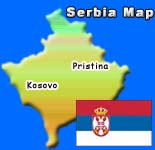Unknown Kosovo Albanian group threatens Serbs and EU
 Pristina - An unknown Albanian group on Thursday claimed responsibility for a bomb attack on a European Union office in Kosovo earlier this month and warned of attacks against the Serb minority.
Pristina - An unknown Albanian group on Thursday claimed responsibility for a bomb attack on a European Union office in Kosovo earlier this month and warned of attacks against the Serb minority.
Three Germans, allegedly Berlin's intelligence agents, were arrested in connection with the November 14 bombing of the EU office, but were expected to be released Thursday due to lack of evidence.
The obscure group, calling itself "Army of the Republic of Kosovo - ARK" sent its threatening e-mail to authorities, the media and international organizations in Kosovo.
It warned of "strikes with full force" because of a new United Nations plan for Kosovo, the former Serbian province with an Albanian majority which declared independence in February.
The message referred to changes in the framework for a law- enforcing EU mission that was due to take over from a UN administration in December and help Kosovo's transition into a fully-fledged state.
The UN and Belgrade have agreed that the EU's mission, Eulex, would be "status-neutral" and remain under UN command in areas dominated by Serbs - which Albanians fear would be a step toward an ethnic partition of Kosovo.
"Unless the UN plan is withdrawn ... we will strike with our full force. There will be no security for Serbs who live in Kosovo," the ARK e-mail said, promising to "chop off Kosovo Serb heads and send them to Serb politicians."
The purported group also threatened to bomb Eulex if it remains neutral to the status of Kosovo and to "start a new conflict, not only in Kosovo."
Kosovo police spokesman Veton Elshani told Deutsche Presse-Agentur dpa in Pristina that the ARK group was not known, but that threats were "taken very seriously" and counter-terrorist agents were investigating.
Kosovo came under UN administration in 1999 after NATO ousted Belgrade's security forces to end the ethnic conflict.
Albanian rebel groups, which launched terror attacks against police and soldiers, also sprang up in southern Serbia and Macedonia between 1999 and 2001.
Messages with unsubstantiated threats by extremist Albanians, Serbs or Macedonians, remained common throughout the volatile area. (dpa)